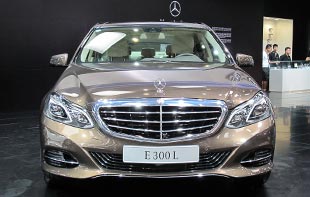

|
Brompton has set up a bike store in Shanghai, and plans to open a second one in another city. Provided to China Daily |
Brompton, Britain's handmade portable bike, unfolds plans for China's commuters
Britain's folding bike, the Brompton, has embarked on a sturdy little trail across China hoping to provide a convenient commuting and recreation option for the country's upwardly mobile urban population.
Since its founding in 1976, Brompton's bikes have become a common sight in cities across Europe and the US as thousands take to two small wheels for short-distance travel to avoid traffic jams and promote fitness.
To share this product with Chinese consumers, Brompton established a store in Shanghai last September, and plans to open a second within the next 12 months in Beijing or Guangzhou.
"If urban dwellers wish to save money on monthly gym fees they can cycle all or most of the way to and from work, school or university," says Quinton Pullinger, Asia-Pacific marketing manager of Brompton.
"City dwellers often worry about their bicycle being stolen, even if locked up. But the Brompton folds up and can be taken with you to the office, coffee shop, restaurant, school, and almost everywhere."
Pullinger says the Brompton's folding element allows it to be easily used in conjunction with public transport such as trains and buses. You simply carry it on and off like a suitcase or parcel.
Brompton bicycles cost from 10,000 yuan ($1,628) to 26,000 yuan in China. That's not cheap, but Pullinger is convinced China's increasingly wealthy middle-class consumers can well afford it.
The fact Brompton hand-makes its bikes in the UK justifies the premium, he says, and he believes the brand's heritage and quality are attractive to Chinese consumers.
The Brompton, finely engineered with a frame mainly made of steel for strength and endurance, is designed to be practical and portable, weighing between 9 and 12 kilos in total.
Following extensive market research in China, Pullinger says he realized that Chinese consumers care very much about quality. They are also increasingly sophisticated and capable of judging the quality of foreign brands, as opposed to taking it for granted.
"Chinese consumers have become more aware of international brands and now take time to understand what a brand is about, what its heritage is," he says.
 Models at Ford pavilion at Chengdu Motor Show
Models at Ford pavilion at Chengdu Motor Show
 Brilliant future expected for Chinese cinema: interview
Brilliant future expected for Chinese cinema: interview
 Chang'an launches Eado XT at Chengdu Motor Show
Chang'an launches Eado XT at Chengdu Motor Show
 Hainan Airlines makes maiden flight to Chicago
Hainan Airlines makes maiden flight to Chicago
 Highlights of 2013 Chengdu Motor Show
Highlights of 2013 Chengdu Motor Show
 New Mercedes E-Class China debut at Chengdu Motor Show
New Mercedes E-Class China debut at Chengdu Motor Show
 'Jurassic Park 3D' remains atop Chinese box office
'Jurassic Park 3D' remains atop Chinese box office
 Beauty reveals secrets of fashion consultant
Beauty reveals secrets of fashion consultant